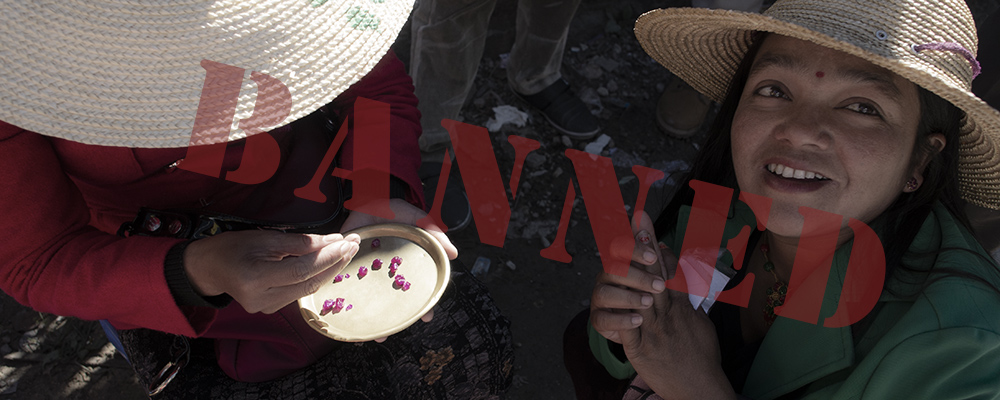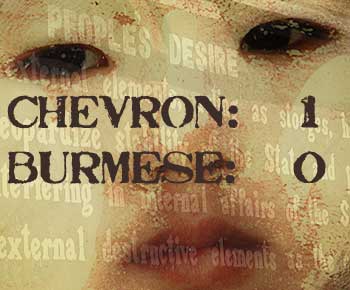In 2003, the US government signed into law a ban on the importation of any article that was produced, mined, manufactured, grown or assembled in Burma (Myanmar), creating a defacto ban on the importation of Burmese gems. This article examines both the pros and cons of that ban.
Banned! Burmese Gems in the Crossfire
|
July 30, 2008 Update On July 29th 2008, US President George W. Bush signed into law the Tom Lantos Block Burmese JADE (Junta's Anti-Democratic Efforts) Act of 2008, which modifies the Burmese Freedom and Democracy Act of 2003 (H.R. 2330). This updated act prohibits "substantial transformation" being used to import Burmese jade or ruby. For an update on this article, see: Chevron: 1; Burmese: 0
|
Note: On July 28th 2003, US President George W. Bush signed into law the Burmese Freedom and Democracy Act of 2003 (H.R. 2330). This act bans the importation into the United States of any article that is produced, mined, manufactured, grown or assembled in Burma. The following piece is actually two:
- Thoughts on the US Embargo Against Burma by Richard W. Hughes
- How Sanctions Can Work by Brian Leber
In these two articles, Richard Hughes and Brian Leber examine the impact of these sanctions on the US gem trade, along with the entire issue of national sanctions, both pro and con.
Thoughts on the US Embargo Against Burma
|
The embargo and the gem trade The Burmese Freedom and Democracy Act of 2003, which took effect on Aug. 28, 2003, effectively banned the importation into the US of any Burmese product, including all precious stones, pearls, jewelry and mineral specimens are now prohibited imports. It applies only to new imports. All goods imported before the enforcement of this law may still be legally traded. Most companies involved in colored stones have a number of Burmese gems in their inventories. Those that were imported prior to Aug. 28, 2003 can still be legally traded. However, as the article below shows, the interaction of the gem industry with Burma and its politics is not simply a black-and-white issue, but one deserving further thought. Questions about the banWhat about Burmese gems already in the US before the ban. Can they be legally traded?Yes, they may be legally bought and sold. What about Burmese gems which were exported from Burma before the ban, but did not enter the US before the ban. Can they be legally imported?On the surface, it would appear that these can be imported so long as it can be documented that those goods left Burma before the ban. What are the prospects for the embargo being lifted?While it is impossible to predict, the language of the Act is such that it will probably take the installation of a democratic government in Burma for it to be lifted. And the prospects for the Burmese military allowing this to occur are quite slim. Thus it appears the embargo will be in place for a long, long time. |
Throughout history, more powerful nations have utilized embargoes as a means of influencing the policies of lesser countries. The latest example is the just-signed sanctions bill against Burma.
Other instances include the 40-plus year-old embargo against Cuba, which continues to this day, and the embargo against Vietnam, which was removed in 1994.
The Vietnam embargo provides an interesting case study. Let’s take a look.
Revenge
Shortly after the defeat of US-backed forces in 1975, Cambodia’s Khmer Rouge began attacking Vietnamese villages along their common border. By 1978, these attacks provoked a response. Vietnam invaded Cambodia, quickly toppled the Khmer Rouge and installed a puppet regime.
The world’s response to this was frightening. Rather than moving to assist the rebuilding of this shattered nation, many governments (including Thailand, China and the US) began covert destabilization of the new regime. This included substantial aid to the Khmer Rouge. Simultaneously, China invaded northern Vietnam to teach the Vietnamese “a lesson.”
A third prong of this collective attack was prolongation of a US-led embargo against Vietnam (which had begun in 1964), mainly in protest for their invasion of Cambodia.
By 1987, Vietnam had tired of the Cambodian occupation and announced plans for a gradual withdrawal of troops. As of 1989, the bulk were gone.
Tellingly, this did not result in the lifting of the embargo. Washington instead moved the goalposts back, stipulating new conditions (MIA’s) and it was not until 1994, that the embargo finally disappeared. In the words of British journalist, John Pilger, “America’s attempt to isolate and impoverish Vietnam ended as ignominiously as had the war. There was no apology.”
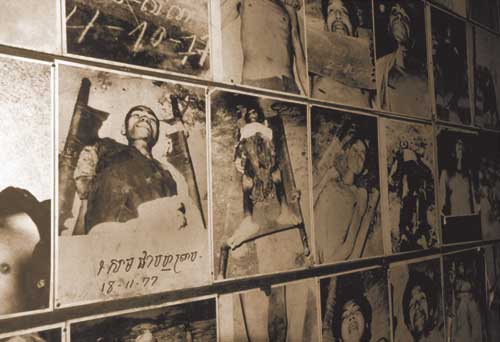 Pictures of the dead at Cambodia’s notorious Tuol Sleng (S-21) prison, where the Khmer Rouge tortured those they regarded as enemies. Some 17,000 entered – only seven survived. The dead included nationals of Vietnam, India, Pakistan, Laos, Thailand, Canada, the UK, Australia, New Zealand and the US. But most were Cambodian. When Vietnam invaded Cambodia in 1978 to remove this abhorrent regime, Thailand, China, the US and other countries provided covert assistance to the Khmer Rouge to fight the Vietnamese. A US embargo against Vietnam was kept in place until 1994, to punish the Vietnamese for their invasion. Photo: R.W. Hughes.
Pictures of the dead at Cambodia’s notorious Tuol Sleng (S-21) prison, where the Khmer Rouge tortured those they regarded as enemies. Some 17,000 entered – only seven survived. The dead included nationals of Vietnam, India, Pakistan, Laos, Thailand, Canada, the UK, Australia, New Zealand and the US. But most were Cambodian. When Vietnam invaded Cambodia in 1978 to remove this abhorrent regime, Thailand, China, the US and other countries provided covert assistance to the Khmer Rouge to fight the Vietnamese. A US embargo against Vietnam was kept in place until 1994, to punish the Vietnamese for their invasion. Photo: R.W. Hughes.
Pictures of the dead at Cambodia’s notorious Tuol Sleng (S-21) prison, where the Khmer Rouge tortured those they regarded as enemies. Some 17,000 entered – only seven survived. The dead included nationals of Vietnam, India, Pakistan, Laos, Thailand, Canada, the UK, Australia, New Zealand and the US. But most were Cambodian. When Vietnam invaded Cambodia in 1978 to remove this abhorrent regime, Thailand, China, the US and other countries provided covert assistance to the Khmer Rouge to fight the Vietnamese. A US embargo against Vietnam was kept in place until 1994, to punish the Vietnamese for their invasion. Photo: R.W. Hughes.
Blood from a stone
Today, because of human rights violations, the world is asked to boycott diamonds from several poor African nations. In the 1970s and 80s, much of the world boycotted South African products. But diamonds, whose trade was controlled by a South African company, were not included. Why not? Consistency becomes an unpronounceable tongue-twister when big business is forced to mouth the word.
If Americans pay attention, they will find Washington has often unsheathed its sword of sanctions. But the manner in which it has done so is so haphazard as to be downright dangerous. Witness the following:
In 1998, the US Congress passed the International Religious Freedom Act (H.R. 2431). This act calls for nations guilty of particularly severe violations of religious freedom to be subject to censure, including economic sanctions.
On the surface, this seems a noble cause, except one small detail – its application. To cite just one example, Saudi Arabia, where the practice of any religion beyond Islam is de facto banned, has never been sanctioned for restricting religious freedom. Consistency. Tough to pronounce, isn’t it?
The war on terrorism
Congress has also passed similar laws directed against nations that support terrorism, and it is here that we find true outrage.
What? I speak of Afghanistan. Not only did this nation harbor Osama bin Laden, but it allowed him to run terrorist training camps in the country. Those very al Qaeda camps were targeted by US cruise missiles in 1998, following the bombing of US embassies in Kenya and Tanzania. Yet Afghanistan was never sanctioned for harboring terrorists, as the US State Dept. report released in April 2001 shows.
Why? Many pundits have suggested that, like Saudi Arabia, it is simply a case of oil politick. Unocal wished to build a gas pipeline across Afghanistan, something that would have been forbidden if sanctions had been applied.1
Play power
The above examples demonstrate that embargoes are not just about human rights concerns, anymore than the war on drugs is a war against dangerous drugs.2 Instead, the motivations are various, and are greatly impacted by business interests, emotion and the politics of the day. For Americans, the political doings in Burma have little impact. But for the people of a small nation, even a slight shift in the American political wind can blow them away. Or as they say in SE Asia, when elephants make love, the grass gets trampled.
Turning gold into lead
With the above in mind, it is time we took a look at Burma and road that has led to US sanctions.
Burma was granted independence from Britain in 1947. The movement was led by a charismatic idealist named Aung San. Tragically, just after independence he was assassinated. Even today his picture graces Burmese banknotes.
In 1962, General Ne Win staged a coup and plunged Burma into isolation. His Burmese Road to Socialism resulted in nationalization of virtually all industries and business, including the gem trade. The public was not so kind, terming it the Burmese Road to Poverty. Within years, SE Asia’s richest country quickly slumped to one of the ten poorest in the world.
By 1988, Burma was in a shambles, a tinderbox just waiting to blow. The spark came in the form of a tea-house fight between two students. Both were jailed, but one was immediately sprung by his well-connected father. Outraged, students took to the streets; soon, pro-democracy demonstrations spread across the land.
Drafted into the nascent freedom movement was Aung San’s daughter, Aung San Suu Kyi, who happened to be in Rangoon nursing her sick mother. This charismatic woman quickly rose to lead Burma’s pro-democracy movement.
While the demonstrations forced Ne Win to step down, the military remained firmly in control. In the end, with revolution just an eyelash away, they sent tanks and soldiers into the streets, putting an end to the demonstrations, Tiananmen-style. Thousands were killed, probably more than in Beijing.
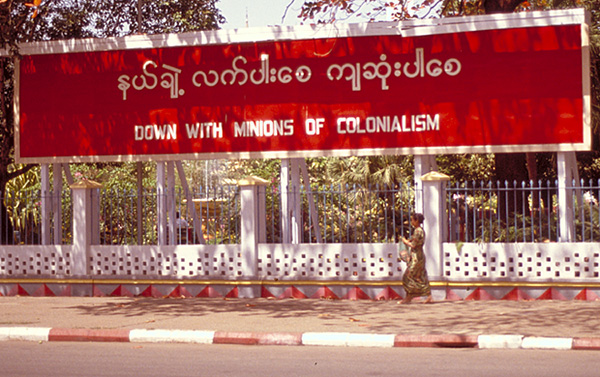 Following the military-led massacres in Burma in 1988, the junta put up large signs like this throughout the country. Will sanctions serve to embarrass this regime, or simply play to their paranoid world view? Photo: R.W. Hughes.
Following the military-led massacres in Burma in 1988, the junta put up large signs like this throughout the country. Will sanctions serve to embarrass this regime, or simply play to their paranoid world view? Photo: R.W. Hughes.
Following the crackdown, the military made a crucial mistake. Underestimating support for Suu Kyi and her National League for Democracy (NLD), they called for elections in 1990, assuming intimidation would be enough. Bad move. Suu Kyi’s NLD won by a landslide.
Pooling their meager wits, the military threw democracy to the wind and retreated to what they knew best – repression. They began rounding up NLD members on trumped-up charges; Suu Kyi herself was placed under house arrest even before the elections. Those that weren’t arrested soon fled the country.
“The Lady” as she is known in Burma, showed her strength, refusing to bow to pressure to leave the country, refusing to compromise with the military. Her non-violent Gandhi-like approach earned her the Nobel Peace Prize in 1991.3
In 1995, under tremendous international pressure, the military released Suu Kyi from house arrest. She began giving speeches in front of her house that, despite government repression, were attended by hundreds, including many curious foreigners. From 2000–2002, the military again placed her under house arrest. Once again upon her release, she began speaking, and even traveling around the country visiting NLD offices. Her speeches began to attract more and more people, which again forced the military’s hand.
On May 30 2003, Suu Kyi and her convoy were attacked by what eyewitnesses, journalists and foreign diplomats have said was a military-instigated mob. Scores are said to have died. Suu Kyi was unhurt, but once again found herself back in detention, this time in prison.
It was this latest event, just one in a long string of atrocities, that resulted in the recent US sanctions.
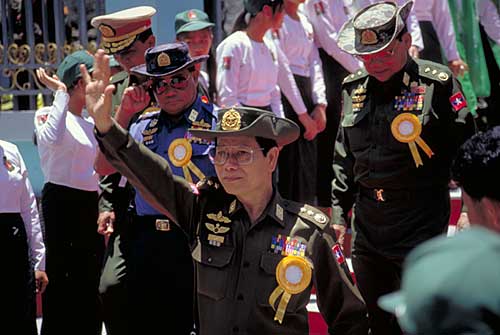 Unreal Politick: Khin Nyunt (center) and other Burmese generals pressing the cowered flesh in Tachilek in 1996. Once head of Burma’s notorious Military Intelligence (MI), Khin Nyunt is today (2004) considered a moderate in the ruling junta. Photo: R.W. Hughes
Unreal Politick: Khin Nyunt (center) and other Burmese generals pressing the cowered flesh in Tachilek in 1996. Once head of Burma’s notorious Military Intelligence (MI), Khin Nyunt is today (2004) considered a moderate in the ruling junta. Photo: R.W. Hughes
Signed D.C.
The prospects of US sanctions forcing the Burmese military to give up power is probably about the same as US sanctions forcing Castro from office. Ain’t gonna happen.
In order for sanctions to be effective, they must be broad-based. It is not enough for the US, a relatively minor trading partner of Burma, to stop the import of Burmese goods. To work, sanctions have to be done with the UN, and in particular, with the Association of Southeast Asian Nations (ASEAN). It is Thailand, Malaysia and Singapore, along with India and China, that are Burma’s major trading partners. Without these nations joining the US and EU, sanctions will mean nothing. China has already condemned the US sanctions.
Meanwhile, sanctions will certainly harm the poor in Burma. Those on the bottom rungs will slip still lower. And, as a friend pointed out, with a regime already noted for its Orwellian character, repression may actually increase as the Burmese military becomes yet more paranoid about security.
As a footnote, please realize that all animals are equal, but some more than others. The sanctions bill signed by Bush includes an exemption for US diplomatic or consular officials, who will be allowed to bring in Burmese goods so long as they are not for resale. That’s a sweet touch. Thanks, Washington.
Rock and roll
And what of Burma’s precious stone trade? Lest we forget, the world already has a longstanding boycott against another Burmese product – narcotics. This has done little to stop the flow of amphetamines and heroin. Gems will be even more difficult to stop.
While Burma’s gem mines are nominally under the control of the military, the very nature of gem mining means that the lion’s share of production is smuggled out by freebooters. Funds from these smuggled goods sustain both ordinary miners and traders, as well as rebel armies fighting against the Burmese military.
In practical terms, what the current boycott will mean for the gem industry is rock and roll. Those lacking scruples in the rock trade will just roll with business as usual. The Burmese gems they import will come in as Thai, Sri Lanka, Indian or other origin. The honest among us will simply stop selling Burmese gems. And the customs agents who can tell the difference will decide not to rock the good ship of foreign trade. Exports to Iraq or Iran? Imports from Saudi Arabia or China? Black and white so often gets lost in all those shades of gray.
Today, Burma supplies over 95% of the world’s fine ruby and even more of the world’s fine jadeite jade. With the current embargo, honest US sellers of those products will soon be replaced by those for whom sanctions mean nothing. Thanks, again, Washington.
Peace train
Embargoes. I used to support them all. South Africa? How could anyone with a conscience do business there? Iraq? Didn't Saddam brazenly invade another sovereign nation? Boycott him!
I'm no longer a child. I no longer see the world in just black and white.
And just what have I learned? Ultimately, that we must avoid war, for peace is worth almost any cost. Yes, there will be those who cite Poland, Czechoslovakia. To which I will cite Cambodia, Laos and, dare I say it, Iraq. For so many people of those nations, the difference between “right” and “wrong” is an empty intellectual exercise. Caring is not easy when you are dead.
Just look at Iraq, where over a decade of sanctions did nothing to change the regime, but, by UNICEF estimates, killed 500,000 Iraqi children. And how about Vietnam, where ideological differences developed into a war that quickly spread throughout the region, causing millions of deaths all across SE Asia. With Agent Orange and unexploded ordnance, the deaths continue to this day, just as the grim reaper of depleted uranium will continue to harvest a human crop in Iraq for decades to come.
It’s the politics, stupid!
Will banning imports from Burma really be a force for positive change, or is this just another empty “message in a bottle” floated out to sea with no hope of arriving at the proper address? That is the ultimate question.
The reality is that ordinary trade with Burma never killed anyone. Even the illegal drugs exported from Burma have killed far fewer than American tobacco products alone. In the end, it is politics, not products, that are to blame. Yet leaders cannot grasp this simple fact. Boycott this, boycott that, boycott anything but the bankrupt ideas behind so much of the world’s misery.
How’s this for a policy suggestion? Boycott bozos. Boycott those who deny others free will.
When the US prepared to invade Iraq, my wife likened it to bombing an entire home to save a woman from an abusive husband. Of course, she grew up in SE Asia during the Vietnam conflict. She had seen it all before.
Burma? I offer no answers. But I have hope. Here’s to hoping Burma will not end up as just another demolished dwelling, another village destroyed “to save it.” Here’s to hoping that one Vietnam was enough for America. Here’s to hoping that one day the long-suffering Burmese will escape all the bozos that imprison them.
Footnotes (click your browser’s ‘back’ button to return to the text)
- After 9/11, the US invaded Afghanistan and appointed a former Unocal consultant, Zalmay Khalilzad, as special envoy to Afghanistan; shortly thereafter, the pipeline project was reactivated.
- Remember, two legal substances, alcohol and tobacco, kill more than all illegal drugs combined.
- If Palestine had had such a leader, the world might be enjoying peace in the Middle East today.
Further Reading
- Hughes, Richard W. (2001) Heat Wave: The Heat and Burmese Rubies.
- Hughes, Richard W. (2001) Conspiracy Theory: Gems & Junkies in Burma.
About the author
Richard W. Hughes is one of the world’s foremost experts on ruby and sapphire. The author of several books and over 170 articles, his writings and photographs have appeared in a diverse range of publications, and he has received numerous industry awards. Co-winner of the 2004 Edward J. Gübelin Most Valuable Article Award from Gems & Gemology magazine, the following year he was awarded a Richard T. Liddicoat Journalism Award from the American Gem Society. In 2010, he received the Antonio C. Bonanno Award for Excellence in Gemology from the Accredited Gemologists Association. The Association Française de Gemmologie (AFG) in 2013 named Richard as one of the fifty most important figures that have shaped the history of gems since antiquity. In 2016, Richard was awarded a visiting professorship at Shanghai's Tongji University. 2017 saw the publication of Richard's Ruby & Sapphire: A Gemologist's Guide, arguably the most complete book ever published on a single gem species and the culmination of nearly four decades of work in gemology.
How Sanctions Can Work
by Brian Leber
Burma. The name inspires, to those that know and love fine gemstones, visions of a mythical land. But that illusion begins to crumble when one reads the reports of the human rights abuses and other abominations perpetrated by the current regime upon the people of Burma and their country.
Because of this horrid legacy, Burma (or Myanmar as the ruling government wishes to rename the country 1) is now the focus of a United States embargo. The embargo forbids trade with this nation (along with other punitive measures aimed at the government) that has lived since 1960 under the heavy-handed (and illegal) rule of the military regime (the ironically named State Peace and Development Council).
Perfecting undevelopment
For over four decades we have witnessed a nation, once considered the most promising in the region, descend to a depth ranking it, according to a United Nations report, among the most under-developed nations in the world. In the face of innumerable and well-documented crimes that according to a reports issued by both the U.S. State Department 2 and Human Rights Watch 3, range from the use of forced labor (including the use of children), to the systemized rape of women and young girls, to ethnic cleansing of opposition minority groups. It is only relatively recent that the western developed nations have begun to take notice.
In the last decade the U.S. share of trade with Burma has dropped precipitously (from over $2 billion in 1993 to $226 million in 2002 4) as countless firms have independently ceased doing business in a country with such an abysmal track record of human rights violations. With the military junta maintaining a firm grasp on all sectors of business from mining to manufacturing to tourism (as well as allowing virtually no legal, independent free-enterprise and maintaining a leasehold on the extraction of natural resources, including gemstones), this independent boycott has sought to make clear to the rulers of Burma that the outside world would not tolerate their chosen path. This year, the United States government has formally echoed the path set forth by countless individuals and organizations throughout the world by heeding the word’s of the duly elected leader Aung San Suu Kyi when she said, “economic sanctions are good and necessary for the fast democratization of Burma.”5. This is a major step towards what one would hope will be a long-term commitment that can help secure genuine change in Burma.
Censure-ship
It is important to realize that the function of a well-managed economic boycott is not to cause the catastrophic collapse of a country. This would prove counter-productive when viewed long-term, as it would make a bad situation potentially worse. However, such a mechanism of economic action is designed to act as a formal censure reflective of both consumer and corporate sentiment towards the offending nation, which can, if effectively administered, lead to further dialog and progress towards reform. Optimally, an economic action like this would occur solely in the private sector but as some industries have opted to ignore the precedent set by the majority of western business working with the government in Burma, government formalization of an action like this is necessary to ensure compliance of all parties.
In addition to the economic impetus, sanctions lend credibility to the cause and offer support to those working within Burma for democracy. (Aung San Suu Kyi and the National League for Democracy [NLD]) have both called for sanctions against the military government 6.) Despite the fact that the Myanmar government has “condemned” these sanctions, it is most certain that even a regime as xenophobic and reclusive as they are, does not wish to be raised to the pinnacle of being viewed as a pariah state in the world’s eyes. They would very much like this matter to remain an “internal affair”, and not have it generate any international interest.
Yet as this issue gains wider recognition, it has generated increased attention upon Burma. It is this increased international scrutiny that the government in Burma most desperately seeks to avoid. It is also one of the most effective non-violent weapons the outside world can wield against this isolationist state. This is why awareness of the embargo must be raised to and maintained at the forefront.
Broadening the sanctions
But the United States (and a concurrent EU) embargo must only be a first step. The next obvious step is to bring this measure before the United Nations, which has proven in the past to be a much-needed neutral ground for dealing with Burma. (The UN was crucial in securing Suu Kyi’s, as well as other political and religious dissidents release during their prior house arrest.) A clear majority of member nations have already spoken out against the regime’s human rights record as well as its current detention of Aung San Suu Kyi. Of these member nations, China remains one of Burma’s few remaining trade partners. While any measure brought to vote at the UN regarding collective action against Burma would most likely be vetoed by China, it is China’s hesitancy to use their veto that could encourage them to exercise diplomatic pressure against Burma to begin a process of reformation towards democracy.
Many feel sanctions will not work and are a wasted effort on this isolationist government. In some scenarios this holds true when the international community does not share the will for change. (Well illustrated by the on-going US led boycott against Cuba.) However, in cases where there is genuine international consensus as to the goal of international pressure on a regime, sanctions can accomplish amazing things. (With the exception of China, India, and Bangladesh, Burma’s historically significant trading partners have all voiced strong disapproval of future business with the current government.) This is finely exemplified by the political actions that ended apartheid in South Africa.
Additionally, there is concern that an embargo such as this will only harm the common people while leaving the military junta unscathed. However, according to Min Zaw Oyo, Outreach Director at the Free-Burma Coalition 7 as well as a Burmese citizen living in exile since 1990 “The economic sanction restricts largely on the sector of (the) formal economy which is mainly controlled and operated by the regime. Burmese people are still depending on the informal economy for their day-to-day survival. The sanction has very limited effect on the informal economy majority of Burmese rely on.” This echoes the sentiments of the NLD and Suu Kyi’s opinion on the subject.
Naturally, there are no guarantees with any action of this sort, but to remain passive out of apathy or fear of failure would be criminal. To continue with business-as-usual in light of the changing attitudes toward Burma would make any of us an accomplice to a wretched government.
It’s time to act
As a member of the jewelry industry, I have witnessed my industry frequently treat human rights issues as secondary to economic concerns, until public awareness is raised to a level that action must be taken. (I think of the history of the conflict diamonds issue, where many major organizations were aware of, and sought to bury the facts, until groups like Amnesty International and Global Witness, combined with media attention, made the issue a very public matter.) But I have hopes this issue will be different. As rubies, sapphires, jade, peridot and spinel are the significant contributions Burma makes to the jewelry industry, it is the colored stone industry that is most affected by this boycott. Combined with trade concerns, a number of leading colored stone people and businesses (including Richard Hughes and Pala International among others) have a genuine concern for the well being of the people of Burma, as they deal with many individuals in Burma directly. (As opposed to multi-national diamond groups that are far removed from the people and the source of their goods.) But our industry must now act, above and beyond merely following the law. We must work collectively to encourage and foster democracy and human rights in Burma.
Most important and despite the political complexities, whether pro-sanction or anti-sanction, we must not forget the people of Burma. It is they who had their country stolen from them in 1962 by an illegal military government and who have suffered under one of the worst regimes to exist in the 21st century. We should all encourage our respective governments to not allow this embargo to become a forgotten piece of legislation but an active means to bring freedom and peace to Burma. We should encourage our governments to act as many EU nations did during the apartheid sanctions, by offering substantial humanitarian aid to the individuals who suffer while maintaining focused efforts against the abusive regime. The United States, with its formalization of sanctions, is in a key position to set an example that the rest of the world can follow in regards to Burma. Let us do so firmly, yet compassionately.
Footnotes (click your browser’s ‘back’ button to return to the text)
- The country’s name changed from Burma to Myanmar in 1989. The decision to call the country either “Burma” or “Myanmar” in any writing is telling because it reveals the direction of the writer’s or publisher’s sympathies. The government insists that “Union of Myanmar” is the legal name, and that the British imposed “Burma” upon the country. Any reference to the country as “Burma” is, to them, insulting. But opponents state that “Myanmar” is the name used by Burman – the ethnic majority – nationalists, and is therefore insulting to other ethnicities. All ethnic groups signed the 1947 Panglong Agreement to form the country called the Union of Burma. Opponents of the government assert that any name change of a country should be done with the support of the people.)
- United States Department of State
Bureau of East Asian and Pacific Affairs
Conditions in Burma and U.S. Policy Toward Burma for the Period September 28, 2002–March 27, 2003
Released April 11, 2003 - Human Rights Watch
World Report 2003–Burma - According to the Cato Institute, 1000 Massachusetts Avenue, N.W. Washington D.C. 20001-5403 www.cato.org
- From a statement “Every Day is A Special Day for Democracy.” – Aung San Suu Kyi
- “It became obvious that the military authorities were not interested in bringing democracy to Burma, but simply in strengthening their own position, and using economic means to strengthen their position, we decided that economic sanctions were necessary.”– Statement by NLD Secretary General Aung San Suu Kyi September 1999
- Min Zaw Oo –Director of Strategy and Outreach, Free Burma Coalition
About the author
Brian Leber is the proprietor of Leber Jeweler Inc., just outside of Chicago, IL.


